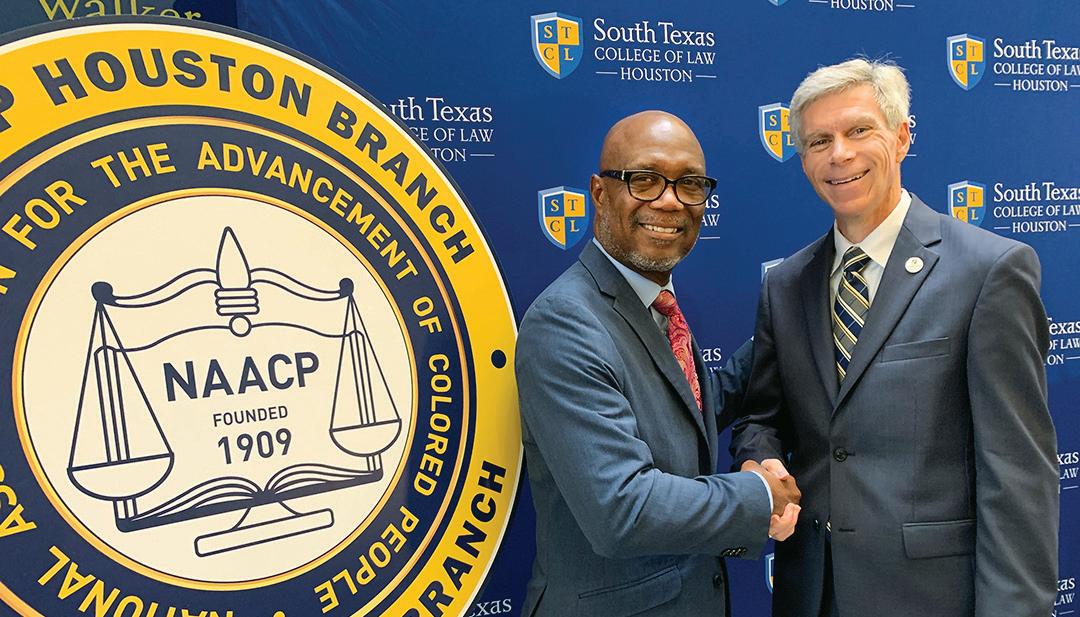
3 minute read
Joining Forces
Seeking clemency for Camp Logan soldiers unjustly convicted, punished in Houston in 1917
large crowd of community leaders gathered at South Texas College of Law Houston Dec.17 to commemorate the law school’s ongoing collaboration with the NAACP Houston Branch. The organizations are fighting for clemency for the 110 soldiers of the 3rd Battalion, 24th Infantry Regiment convicted by General Courts-Martial for their alleged role in the 1917 Camp Logan uprising.
Advertisement
Michael F. Barry, STCL Houston president and dean, and Dr. James Dixon, NAACP Houston Branch board president, signed a memorandum of understanding outlining some of the ways the organizations plan to enhance their ongoing efforts to right a wrong. The signing ceremony, and the tragic story prompting it, received significant local, regional, national and military press coverage, helping further raise the profile of the issue.
“This incident was one of the first projects the NAACP Houston Branch ever investigated a century ago, and it continues to be important to us today,” Dixon said. “We must address this past injustice and educate people about the wrongs that occurred so they don’t happen again. We are determined to seek clemency for these soldiers because it is never too late to do the right thing.”
Geoffrey Corn, the Gary A. Kuiper Distinguished Professor of National Security Law at STCL Houston and retired U.S. Army JAG officer, explained the Camp Logan history leading to this work.
“On Aug. 23, 1917, members of the 3rd Battalion, 24th Infantry Regiment — an all-African American Army unit with a distinguished history of combat service (often called the Buffalo Soldiers) — marched out of its encampment in Houston to confront what it believed was a white mob setting upon the soldiers,” Corn noted at the event. The incident, which resulted in the deaths of 11 locals and six soldiers, was the culmination of weeks of racially charged confrontations between members of the unit and the local Houston police. “The actual violence that night lasted approximately three hours, but the implications of the unjust convictions and punishments that occurred afterward have lasted a century,” Corn said. “These soldiers — regardless of the circumstances of the violence that occurred — did not receive due process and had no opportunity to appeal. The justice system failed them.”
A
“The NAACP Houston Branch and South Texas College of Law Houston share a common priority: a focus on justice,” Barry said. Angela Holder, great-niece of Cpl. Jesse Moore, one of the soldiers convicted and executed in 1917, said, “These 24th Infantry Regiment soldiers are not just names in history. They are real people. They sacrificed for our country, and now they deserve clemency.” Because of their shared commitment to equal justice under the law, the NAACP Houston Branch and STCL Houston will continue collaborating to fulfill the mission of obtaining clemency for these Camp Logan soldiers, Barry said. The NAACP Houston Branch led an effort, initiated on the The signing ceremony, 100th anniversary of the incident in 2017, to seek a pardon for and the tragic story the 13 soldiers sentenced to death in the first trial. Unfortunately, that effort stalled without a successful outcome. Corn was asked prompting it, received to provide advice to the NAACP group working on this effort, significant local, regional, and he continues to be actively involved. Dru Brenner-Beck — also a retired U.S. Army JAG officer who will join the STCL national and military faculty this summer — has led an effort along with historian press coverage, helping John Haymond to conduct a comprehensive review of the records related to this incident and these military trials, based on extensive further raise the profile historical records at the law school and other records throughout of the issue. the country. South Texas librarians and law students working in the Actual Innocence Clinic have contributed substantially to this effort by providing important research and narratives of the many soldiers convicted in the trials. “This effort is about the past, about righting a historic wrong,” Barry said. “But this effort benefits us all tomorrow, as well, helping ensure the violations of due process of a century ago will never be repeated.”
Dr. James Dixon, NAACP Houston Branch board president, shakes hands with STCL Houston President and Dean Michael F. Barry shortly after an MOU signing ceremony.









